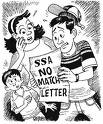 The United States Chamber of Commerce believes that this initiative enacted today by The Department of Homeland Security,” will have an adverse effect on our economy and national security.”
The United States Chamber of Commerce believes that this initiative enacted today by The Department of Homeland Security,” will have an adverse effect on our economy and national security.”
This afternoon, Department of Homeland Security Secretary Michael Chertoff delivered a state of immigration address. He announced that the agency was formally issuing the Social Security No-Match Rule today and said that, “in the coming days, DHS will return to the District Court to request that the injunction be lifted so that implementation of the rule can proceed.” The “Social Security No Match Letter” regulation directs employers to take certain steps when they receive notice from the Social Security Administration (“SSA”) that an employee’s name and social security number do not match, and to potentially terminate them if the discrepancy cannot be resolved within a short 90 day time-frame. Many lawful U.S. Citizens and those legally allowed to work in our country will be caught up in Social Security no-match letters due to the poor quality of the SSA database. Employers will be overwhelmed with paper work as the government seeks to make employers responsible for the decades old administrative problems.
According to the Essential Worker Immigrant Coalition, this initiative is not a positive way to enlist the business community in working to fix the problems that the government created. They claim that the regulation also jeopardizes vital U.S. industries and the U.S. economy as a whole by needlessly creating uncertainties, disruptions, and dislocations throughout in the workforce. Moreover, the regulation would foster anti-Latino and anti-immigrant discrimination and would rely upon a database—Social Security—that is not an effective tool in worksite immigration enforcement. The government defines “reasonable conduct” as seeking to reconcile a no-match letter within ninety days, and if unable to do that, requiring that an employee re-verify his or her work status within three days. If not resolved after ninety-three days, termination is required. There were no such time-limit requirements, no re-verification requirements, and no termination requirements for an unresolved no-match letter before the Final Rule.
In a column last year in The American Prospect, David Bacon argues that, “Social Security was never intended to be a means of determining legal status. The database is meant to ensure that payments are made into the right accounts, and that the benefits are available when people need and qualify for them.” In the end he claims that industries, “like agriculture, meatpacking, construction, hotels, food service, and health care are dependent on immigrant labor and would be grave affected by this rule.”
In a formal letter to The Department of Homeland Security, the United States Hispanic Chamber of Commerce(USHCC) denounced the enforcement of this rule stating that this rule could result in unfair terminations and “will surely result in discrimination.” They added that for fear of repercussions surrounding the rule employers might “steer clear of hiring those perceived to be immigrants.” The letter added that employers might terminate employees if they receive a no match letter immediately rather than deal with the process of verification which would take time and put the employer at risk. The ACLU (American Civil Liberties Union) and others who are against the measure explain that the Social Security database is extremely flawed and that enforcement of this measure could cost employers up to 1 billion dollars per year.
The reality is that this is an attempt to curb illegal immigration that unfortunately places an unfair burden on employers. It also puts Latinos who are American Citizens or legal residents at risk for discrimination in the workplace or during the hiring process. Measures such as these cannot compensate for a lack of comprehensive Federal Immigration Reform. It seems that this rule places a burden that belongs that belongs to the federal government in the hands of employers who are already facing hardships given the state of our economy.
However, Miachel Chertoff insists this rule simply aims to prevent employers from “burying their face in the sand” when it comes to hiring illegal immigrants. It will be interesting to see how the new president will handle this affair and how immigration matter will be handled by the Secretary of Homeland Security that is appointed in 2009.
Overview of No Match-Rule Letter Regulation
Department of Homeland Security Final Rule

Recent Comments